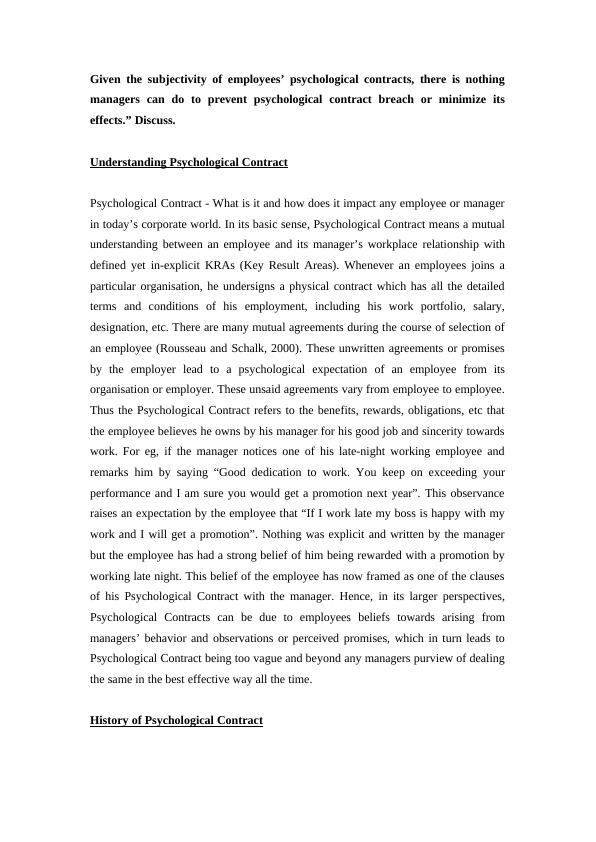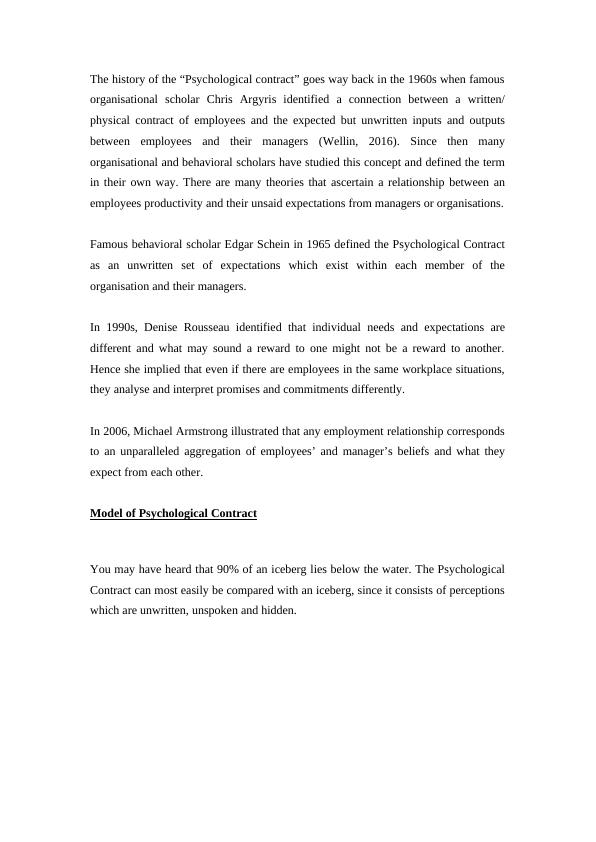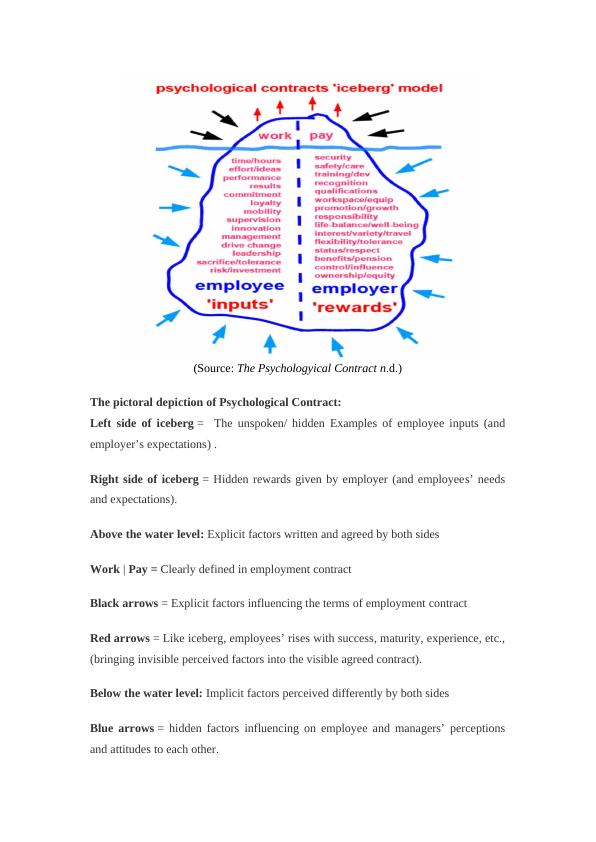Ask a question from expert
Understanding Psychological Contract
7 Pages1959 Words433 Views
Added on 2019-12-18
Understanding Psychological Contract
Added on 2019-12-18
BookmarkShareRelated Documents
Given the subjectivity of employees’ psychological contracts, there is nothingmanagers can do to prevent psychological contract breach or minimize itseffects.” Discuss.Understanding Psychological ContractPsychological Contract - What is it and how does it impact any employee or managerin today’s corporate world. In its basic sense, Psychological Contract means a mutualunderstanding between an employee and its manager’s workplace relationship withdefined yet in-explicit KRAs (Key Result Areas). Whenever an employees joins aparticular organisation, he undersigns a physical contract which has all the detailedterms and conditions of his employment, including his work portfolio, salary,designation, etc. There are many mutual agreements during the course of selection ofan employee (Rousseau and Schalk, 2000). These unwritten agreements or promisesby the employer lead to a psychological expectation of an employee from itsorganisation or employer. These unsaid agreements vary from employee to employee.Thus the Psychological Contract refers to the benefits, rewards, obligations, etc thatthe employee believes he owns by his manager for his good job and sincerity towardswork. For eg, if the manager notices one of his late-night working employee andremarks him by saying “Good dedication to work. You keep on exceeding yourperformance and I am sure you would get a promotion next year”. This observanceraises an expectation by the employee that “If I work late my boss is happy with mywork and I will get a promotion”. Nothing was explicit and written by the managerbut the employee has had a strong belief of him being rewarded with a promotion byworking late night. This belief of the employee has now framed as one of the clausesof his Psychological Contract with the manager. Hence, in its larger perspectives,Psychological Contracts can be due to employees beliefs towards arising frommanagers’ behavior and observations or perceived promises, which in turn leads toPsychological Contract being too vague and beyond any managers purview of dealingthe same in the best effective way all the time. History of Psychological Contract

The history of the “Psychological contract” goes way back in the 1960s when famousorganisational scholar Chris Argyris identified a connection between a written/physical contract of employees and the expected but unwritten inputs and outputsbetween employees and their managers (Wellin, 2016). Since then manyorganisational and behavioral scholars have studied this concept and defined the termin their own way. There are many theories that ascertain a relationship between anemployees productivity and their unsaid expectations from managers or organisations.Famous behavioral scholar Edgar Schein in 1965 defined the Psychological Contractas an unwritten set of expectations which exist within each member of theorganisation and their managers. In 1990s, Denise Rousseau identified that individual needs and expectations aredifferent and what may sound a reward to one might not be a reward to another.Hence she implied that even if there are employees in the same workplace situations,they analyse and interpret promises and commitments differently.In 2006, Michael Armstrong illustrated that any employment relationship correspondsto an unparalleled aggregation of employees’ and manager’s beliefs and what theyexpect from each other. Model of Psychological ContractYou may have heard that 90% of an iceberg lies below the water. The PsychologicalContract can most easily be compared with an iceberg, since it consists of perceptionswhich are unwritten, unspoken and hidden.

(Source: The Psychologyical Contract n.d.)The pictoral depiction of Psychological Contract:Left side of iceberg= The unspoken/ hidden Examples of employee inputs (andemployer’sexpectations).Right side of iceberg= Hidden rewards given by employer (and employees’ needsand expectations).Above the water level:Explicit factors written and agreed by both sidesWork|Pay = Clearly defined in employment contractBlack arrows= Explicit factors influencing the terms of employment contractRed arrows= Like iceberg, employees’ rises with success, maturity, experience, etc.,(bringing invisible perceived factors into the visible agreed contract).Below the water level:Implicit factors perceived differently by both sidesBlue arrows= hidden factors influencing on employee and managers’ perceptionsand attitudes to each other.

End of preview
Want to access all the pages? Upload your documents or become a member.
Related Documents
Discussion on Psychological Contractlg...
|9
|3580
|18
Psychological Contractlg...
|6
|1332
|68
Psychological Contract and its Importancelg...
|12
|3944
|52
Introduction to Human Resource Management & Learning and Talent Development Assessment 2020lg...
|8
|2145
|37
Flexible Working & the Psychological Contract Report 2022lg...
|8
|2004
|49
Psychological Contract Breach and Its Implications on Employee Attitude and Behavioural Job Outcomeslg...
|8
|2268
|469